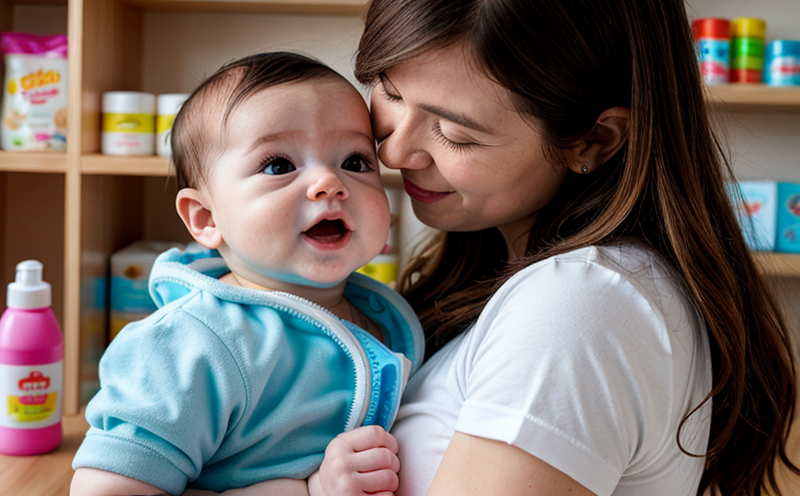Durability Testing of Baby Walkers
The durability testing of baby walkers is a critical aspect of ensuring product safety and compliance with international standards. Baby walkers are designed to support infants in maintaining an upright position while walking, which can be both a fun and educational experience for the child. However, due to their design, they also present potential risks such as falls or entrapment if not manufactured safely.
Testing the durability of baby walkers is essential to identify any weaknesses or potential hazards that could compromise safety during use. This testing typically involves subjecting the walker to a series of mechanical stresses designed to replicate real-world conditions, including but not limited to, loads applied by an infant and repeated movements such as folding and unfolding.
Standardized tests like ISO 9042, which focuses on the structural integrity of baby walkers, are followed closely to ensure that products meet stringent safety criteria. These standards help manufacturers and testers align with regulatory requirements across different regions.
The testing process is divided into several stages, each designed to assess a specific aspect of durability:
- Static Load Testing: This involves applying a specified load for an extended period to check if the walker retains its structural integrity without any deformation or failure.
- Folding and Unfolding Cycles: The walker is subjected to repeated folding and unfolding cycles to simulate frequent use scenarios. This helps identify any issues with latches, hinges, or other components that could lead to accidental collapse.
- Impact Testing: A controlled impact force is applied to the walker from various angles to assess its resistance against impacts that might occur during typical usage.
Durability testing for baby walkers also includes visual inspections and functional checks after each test cycle. These ensure that the product remains safe and operable post-testing, which is crucial given the frequent use of these products by young children.
The data collected from durability tests plays a vital role in improving product design and ensuring compliance with relevant safety regulations. Compliance officers and quality managers can rely on these test results to make informed decisions about product modifications or recalls if necessary. R&D engineers benefit from this information as it guides them towards safer, more robust designs that can withstand the rigors of daily use.
In summary, durability testing for baby walkers is not just a formality but a proactive measure aimed at safeguarding infant health and well-being. By adhering to strict standards and undergoing rigorous testing procedures, manufacturers can ensure their products meet high safety benchmarks, thereby gaining consumer trust and fostering brand loyalty.
Scope and Methodology
The scope of durability testing for baby walkers encompasses a wide range of physical and functional assessments. The primary goal is to evaluate the structural integrity and operational reliability of these products under simulated use conditions that mimic real-world scenarios.
In terms of methodology, the process begins with a thorough examination of the product's design and materials used in its construction. This inspection ensures compliance with relevant safety standards such as ISO 9042 for structural integrity.
The testing itself is carried out using specialized equipment designed to replicate the forces and stresses encountered during typical use. For instance, static load tests involve applying a predetermined weight at specific points on the walker to measure its resistance without deformation. Folding and unfolding cycles are conducted multiple times to check latches and hinges for any signs of wear or failure.
Impact testing simulates falls from standing positions, ensuring that the walker can withstand accidental drops without collapsing. After each test cycle, a visual inspection is performed to identify any visible damage or functional anomalies.
Data collected during these tests are meticulously recorded and analyzed to determine whether the product meets all specified criteria for durability. Any deviations from expected outcomes are documented and addressed promptly through design improvements or manufacturing adjustments.
This comprehensive approach ensures that every baby walker undergoes rigorous scrutiny before reaching market shelves, enhancing overall safety standards within this category of consumer products.
Eurolab Advantages
At Eurolab, we pride ourselves on offering unparalleled expertise in product testing and certification. Our team of experienced professionals specializes in ensuring that every product meets the highest safety standards, including those specifically tailored for baby walkers.
Our state-of-the-art facilities are equipped with advanced instrumentation capable of performing even the most demanding durability tests. This allows us to provide accurate results that can be relied upon by manufacturers and regulatory bodies alike.
We offer a range of services beyond mere testing, including consultation on design improvements based on test outcomes, assistance in navigating complex regulations, and support throughout certification processes. These additional offerings help ensure seamless integration into your product development lifecycle.
Our commitment to quality is reflected in our stringent adherence to international standards such as ISO 9042 for structural integrity assessments. By working with Eurolab, you gain access to a network of experts who are dedicated to delivering top-notch testing solutions tailored specifically for the consumer products and product safety sectors.
Choose us for your durability testing needs, and experience the difference that comes from partnering with industry leaders in product safety and compliance.
Why Choose This Test
- Ensures Safety Compliance: By conducting rigorous durability tests, manufacturers can ensure their baby walkers meet stringent safety regulations.
- Promotes Brand Reputation: A proven track record of safety through thorough testing enhances consumer confidence and brand image.
- Informs Design Improvements: Feedback from these tests helps identify areas for enhancement in product design, leading to safer products.
- Avoids Liability Issues: Demonstrating adherence to established standards can help protect manufacturers against potential legal disputes.
- Supports Regulatory Compliance: Regular testing ensures ongoing compliance with ever-changing regulations and guidelines.
- Enhances Consumer Trust: Transparent product safety measures build trust among parents who are concerned about their children's well-being.
By choosing durability testing for baby walkers, you not only contribute to safeguarding infant health but also position your brand as a leader in responsible manufacturing practices.





